2013年九月三日全球軟體巨擘微軟(Microsoft)同意以54.4億歐元,買下諾基亞(Nokia OYJ)的裝置事業和專利。根據兩家公司今天發布的新聞稿,這宗交易包括微軟將以37.9億歐元,買下諾基亞的裝置部門,以及以16.5億歐元買下專利。埃洛普(Stephen Elop)將辭去諾基亞執行長職務,獲得高額離職金並重返微軟。業界普遍認為這是微軟木馬屠城了Nokia, 結局不令人意外.
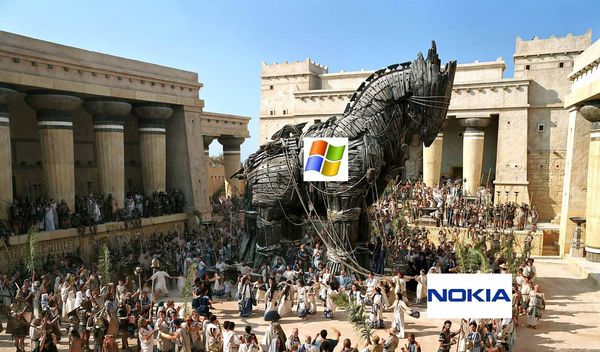
圖片轉貼自網路
而兩家公司的合作與最後併購, 證明了「Two turkeys do not make an Eagle (兩隻火雞不會變成一隻老鷹)」
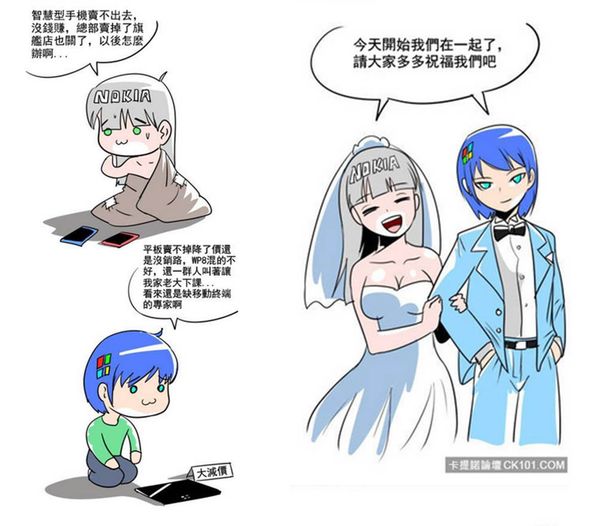
圖片轉貼卡提諾論壇
針對Nokia與微軟德合作, 版主於2011年2月2日就在部落格發表看法, 認為這是欠缺Deep thinking的作法,反而會讓對手坐大, 以後Nokia的市場只會剩芝麻那麼大! 結果, 不幸言中.
NOKIA與微軟都曾是差點完成全世界人手一支手機與PC的巨擘, 為何在行動通訊之役敗到如此難堪地步呢? 過度數字(成本)導向並忽略市場需求, 就是最主要的原因. 昨天版主與一位台灣通訊業者大老吃飯閒聊, 他就感概的說, Nokia訓練出來的人, 都非常重視與善用”數字”. 其實過度重視”數字管理”, 也是即將退休的微軟(Microsoft)執行長鮑默(Steve Ballmer)的管理風格. 數字管理是管理企業績效的顯學, 不過過度依賴數字管理, 只會讓企業文化陷入”為數字而數字”的迷思. 數字管理是為了方便管理, 但不代表可以掌握市場需求. 如果企業的經營者, 只重數字管理, 不懂傾聽市場聲音, 當「破壞性的創新(Disruptive Innovation)來臨時, 即使是巨擘, 最終也是倒下, 只是時間早晚而已.
Stephen Elop是微軟下一任CEO熱門人選, 版主沒見過他本人, 聽說是個很棒的Speaker(演講者). 兩隻火雞不會變成一隻老鷹.微軟想要突圍”iOS”與”Android”的夾殺, 換個新面孔CEO吧! 雖然新面孔的CEO不一定會讓微軟或Lumia手機突圍, 但火雞一定就是火雞, 不會變成老鷹!.
最後僅以下圖, 紀念一下Nokia!
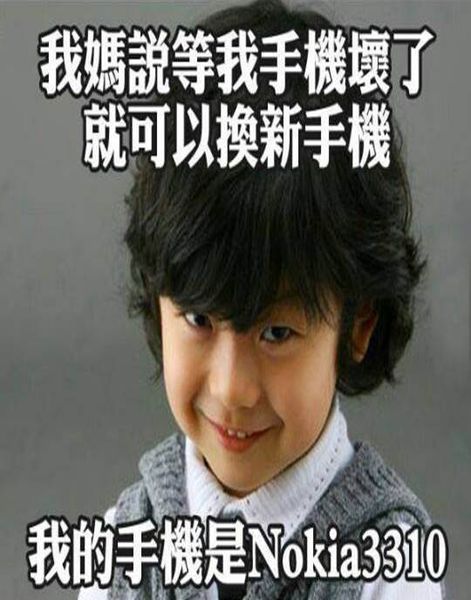
圖片轉貼自網路
NOKIA + 微軟, 有辦法變成一隻老鷹嗎?
小丰子寫於2011/02/12 08:35
全球手機龍頭諾基亞公司(Nokia)11日宣布,將和軟體巨擘微軟策略聯盟,以微軟Windows Phone行動作業系統作為其智慧手機的主要平台,合力迎戰蘋果iPhone和Google Android手機。但市場並不看好這項合作案,諾基亞股價一度重挫12%,創近十個月來最大跌幅。Nokia選擇與微軟合作, 就中長期的策略思維來看並沒有錯, 但Nokia放棄與Google合作, 個人認為這是讓其他競爭對手繼續坐大的戰略敗筆.

Google工程部副總Vic Gundotra在個人推特上發布「Two turkeys do not make an Eagle (兩隻火雞不會變成一隻老鷹)」的發言, 引述先前擔任Nokia副總裁的Anssi Vanjoki針對當年BenQ與Siemens合盟時的評語來反諷Nokia與微軟的合作。由此看來, Nokia確定短期間不會擁抱Google Android系統! 這也代表Nokia這次並沒有決定由The burning platform(熊熊烈火中的平台)跳下來, 而是選擇往更高層樓(頂樓)爬等待救援. 大樓失火的煙囪效應恐怕會讓Nokia原本只要由3樓跳下來的抉擇, 變成可能最後面臨是否要從10樓頂樓跳下來的抉擇.

NOKIA + 微軟, 有辦法變成一隻老鷹嗎? 先來看張忠謀如何改造台積電的故事. 商業週刊“張忠謀六百天改變台積電“一文介紹張忠謀2009年6月老驥重拾戰袍如何讓台積電由停滯不前變成靈活的大象. 其中最關鍵的地方就是他觀察到外商正在培養second source, 但公司卻欠缺Deep thinking. 他在內部會議中痛罵台積電只投資高階製程的做法, 反而會讓對手坐大, 以後台積電的市場只會剩芝麻那麼大! 張忠謀「more than moore」(超越摩爾定律)的策略, 讓台積電去年的營收與獲利創下有史以來最好的一年.

Nokia放棄與Google合作, 代表Nokia的思維就是想變成Apple! 但大家都不是賈柏斯, 短期間都不能取代iPhone. Nokia+微軟的合作讓微軟由手機作業系統的Loser又重新站上了擂台是個大贏家, 但對Nokia而言, 卻有可能讓他的市場變的只會剩下芝麻哪麼大! 由於中國大陸與印度智慧型手機的佔比還小, Nokia的市佔還可苟延殘喘. 不過時間已經有限, Nokia選擇與微軟聯盟及繼續裁員, 恐怕忽視全球電信商的思維, 是個缺乏Deep Thinking的決定.
Nokia過去十幾年來把其他競爭對手打到潰不成軍, 靠的不是其作業平台有多先進, 而是經濟規模下製造成本及全球營運成本較低的優勢+品牌知名度, 這項優勢讓所有競爭對手吃盡苦頭. Stephen Elop放棄Android平台主因是認為Android平台並不容易做出品牌差異性,尤其現行Android裝置平台普遍採取低價策略的狀況,對於解決Nokia當前困境並不是相當適合的決策,因此才會決定與微軟WP7進行合作。這跟台積電當初選擇只投資高階製程的做法思維是一樣的! Stephen Elop 滿足了董事會花小錢得高報酬的意, 但卻讓競爭對手有繼續坐大的機會. 若是Nokia選擇左擁WP7但右擁Andriod, 採取「more than Apple」的策略, 挾低營運成本及高品牌知名度的優勢, 相信會讓想靠Android翻身的一竿子競爭對手剉在等! 不過Stephen Elop畢竟只是一個新任的執行長, 不像張忠謀之於台積電是神主牌的地位, 還是沒辦法決定由熊熊大火往下跳的勇氣.
彭博商業週刊說: 「Apple 賈柏斯的堅持選擇太晚與Verizon及硬是要鎖住Flash所以讓Andioid系統趁機坐大!」 Nokia放棄與Android合作的決定, 讓其他品牌有了Andioid浮木可以喘一口氣. 螞蟻雄兵大戰「團團、圓圓」(熊貓)的結局, 半年後勝負應該就會揭曉!
NOKIA CEO Stephen Elop 致員工備忘錄” The burning platform”中譯文

大家好:
有一個經久流傳的故事,是關於在北海石油開採平臺工作的一個人。有一天晚上,他被巨大的爆炸聲驚醒,突然間整個石油平臺都被熊熊烈火籠罩。幾秒鐘的時間裏,他也被火光包圍在中間。他努力穿過濃煙與烈火,來到了平臺邊緣,往下只能看到黑暗、冰冷和咆哮的大西洋海水。
隨著烈火的靠近,他只有幾秒鐘時間做出反應。他要麼站在平臺上,被烈火無情地吞沒,要麼從30米高的石油平臺跳進冰冷的海水中。這個人站立在“燃燒的平臺”,他需要作出選擇。
他決定跳下去。這有點出乎意料。在通常情況下,他絕不會考慮跳入冰冷的海水中。但他面對的不是通常情況,他所站立的平臺已經著火。他成功跳入海中並存活下來。在被救出來之後,他說,“燃燒的平臺”使得他採取了極端的行為。
我們也站在一個“燃燒的平臺”,我們必須決定如何改變自己的行為。
過去幾個月裏,我與你們共用了我從股東、運營商、開發商、供應商以及你們那裏聽到的話。今天,我要共用我所學到的,以及我所堅信的。
我認識到,我們站在一個燃燒的平臺。
另外,我們的爆炸不只一次,我們面對著多個熾熱的高溫點,使得周圍的火焰越燒越旺。
例如,我們的競爭對手點燃了熾熱的火焰,而且比我們預想的速度更快。蘋果重新定義了智慧手機,將開發人員吸引到一個封閉,但是強大的生態系統,進而摧毀了整個市場。
2008年,蘋果在300美元以上手機市場的佔有率為25%;到2010年市場佔有率上升至61%。2010年第四季度,蘋果營收額同比實現了78%的增長。蘋果的成功說明,只要設計優秀,消費者願意購買擁有出色體驗的高價手機,開發人員也願意為其開發應用。他們改變了遊戲格局,而今天蘋果擁有了高端市場。
其次,還有Android。在大約兩年時間裏,Android已經成為一個能夠吸引應用開發人員、服務提供商和硬體生產商的平臺。Android從高端市場著手,現在已經開始贏得中端市場,很快他們將進入100歐元以下手機的低端市場。谷歌就像地心引力一樣,吸納了行業內大量的創新。
我們不要忘記低端價格區間。2008年,聯發科開始提供手機晶片組,使得中國深圳地區的生產商能夠以難以想像的速度生產手機。有數據顯示,這些生產商的手機佔全球手機出貨量的三分之一以上,在新興市場吞食我們的市場份額。
就在競爭對手向我們的市場份額投下火焰的時候,諾基亞呢?我們落後了,我們錯失了重要趨勢,我們失去了時間。那個時候,我們認為可以做出正確的決定,但實際上,事後發現我們已經落後了幾年。
第一款iPhone在2007年進入市場,而我們直到現在都沒有一款能夠接近iPhone體驗的產品。Android進入我們的視野僅僅兩年時間,而本週Android已經奪去了我們在智慧手機出貨量方面的領先地位。難以想像。
在諾基亞內部,我們有一些出色的創新源泉,但我們未能及時將其引入市場。我們認為MeeGo可以成為贏得高端智慧手機市場的平臺,但以目前的速度,到2011年底,我們也只能向市場推出一款MeeGo產品。
在中端市場,我們還有Symbian,它被證明在北美等成熟市場是不具有競爭力的。另外,Symbian被證明是一個開發人員越來越難以滿足用戶不斷增長的需求的平臺,這導致產品開發速度變慢,給我們在探索新硬體平臺優勢的過程中帶來了不利因素。如果我們像過去一樣繼續下去,那我們必將會進一步落後,而競爭對手則進一步擴大領先優勢。
在低端市場,中國的手機生產商正以遠遠超過我們的速度推出新產品,正如一位諾基亞員工半開玩笑地所說,“就在我們完善Power Point介紹的時間裏”,他們就可以推出新手機。他們速度非常快,價格非常低,因此對我們構成了挑戰。
真正令我們困惑的是我們甚至沒有合適的武器來發起反擊。我們仍然試圖將每部設備的價格達到價格區間。
現在手機之間的競爭已經轉變成整個生態系統的爭奪,而生態系統不僅僅包括產品的硬體和軟體,還包括開發人員、應用程式、電子商務、廣告、搜索、社交應用、地理位置服務、統一通信等。我們的競爭對手們並不是依靠設備來奪取我們的市場份額,而是依靠整個生態系統。這意味著,我們必須決定如何打造和開發生態系統,或者加入某個生態系統。
這是我們要做出的決定之一。我們在失去市場份額的同時,還失去了思維,失去了時間。
週二,標準普爾表示有可能把諾基亞信用評級下調至“負面”。這與穆迪上周給予諾基亞的評級類似。這意味著,在接下來幾週時間裏,他們將對諾基亞進行分析,並決定是否下調諾基亞評級。這何信貸機構考慮做出這種改變?因為他們對我們的競爭力感到擔憂。
消費者對諾基亞的青睞也在全球範圍內下滑。在英國,我們的品牌喜愛程度下降至20%,比去年下降了8%。也就是說,在英國只有五分之一的消費者對諾基亞的喜愛程度超過其他品牌。而在其他一些諾基亞傳統優勢市場,諾基亞品牌的喜愛程度也有所下滑,例如俄羅斯、德國、印度尼西亞、阿聯酋等等。
我們為何會淪落到這種地步?我們為何會在世界發展過程中落後?
這是我一直希望理解的。我認為,至少其中一部分原因要歸結于諾基亞內部。我們自己將石油灑到了燃燒的平臺。我認為在目前變革時代下,我們缺乏足夠的可信度和領導能力來調整和指導公司。我們有一系列的失誤,未能迅速做出創新,內部合作也不夠理想。
諾基亞,我們的平臺正在燃燒。
我們正在探索前方的道路,一條重新建立市場領先的道路。我們會在2月11日公佈新的戰略,這將是公司轉型的一次重大努力。但我堅信,只要齊心協力,我們可以對領先者發起挑戰。只要齊心協力,我們可以將未來掌握在自己手中。
燃燒的平臺迫使一個人改變自己的行為,面對不確定的未來走出大膽、勇敢的一步。這樣他才能夠講出自己的故事。而現在,我們遇到了同樣的機遇。
史蒂芬
中譯文來源:
http://big5.ce.cn/cysc/mobile/xw/201102/10/t20110210_20798141.shtml
原文:
Hello there,
There is a pertinent story about a man who was working on an oil platform in the North Sea . He woke up one night from a loud explosion, which suddenly set his entire oil platform on fire. In mere moments, he was surrounded by flames. Through the smoke and heat, he barely made his way out of the chaos to the platform’s edge. When he looked down over the edge, all he could see were the dark, cold, foreboding Atlantic waters.
As the fire approached him, the man had mere seconds to react. He could stand on the platform, and inevitably be consumed by the burning flames. Or, he could plunge 30 meters in to the freezing waters. The man was standing upon a “burning platform,” and he needed to make a choice.
He decided to jump. It was unexpected. In ordinary circumstances, the man would never consider plunging into icy waters. But these were not ordinary times – his platform was on fire. The man survived the fall and the waters. After he was rescued, he noted that a “burning platform” caused a radical change in his behaviour.
We too, are standing on a “burning platform,” and we must decide how we are going to change our behaviour.
Over the past few months, I’ve shared with you what I’ve heard from our shareholders, operators, developers, suppliers and from you. Today, I’m going to share what I’ve learned and what I have come to believe.
I have learned that we are standing on a burning platform.
And, we have more than one explosion – we have multiple points of scorching heat that are fuelling a blazing fire around us.
For example, there is intense heat coming from our competitors, more rapidly than we ever expected. Apple disrupted the market by redefining the smartphone and attracting developers to a closed, but very powerful ecosystem.
In 2008, Apple’s market share in the $300+ price range was 25 percent; by 2010 it escalated to 61 percent. They are enjoying a tremendous growth trajectory with a 78 percent earnings growth year over year in Q4 2010. Apple demonstrated that if designed well, consumers would buy a high-priced phone with a great experience and developers would build applications. They changed the game, and today, Apple owns the high-end range.
And then, there is Android. In about two years, Android created a platform that attracts application developers, service providers and hardware manufacturers. Android came in at the high-end, they are now winning the mid-range, and quickly they are going downstream to phones under €100. Google has become a gravitational force, drawing much of the industry’s innovation to its core.
Let’s not forget about the low-end price range. In 2008, MediaTek supplied complete reference designs for phone chipsets, which enabled manufacturers in the Shenzhen region of China to produce phones at an unbelievable pace. By some accounts, this ecosystem now produces more than one third of the phones sold globally – taking share from us in emerging markets.
While competitors poured flames on our market share, what happened at Nokia? We fell behind, we missed big trends, and we lost time. At that time, we thought we were making the right decisions; but, with the benefit of hindsight, we now find ourselves years behind.
The first iPhone shipped in 2007, and we still don’t have a product that is close to their experience. Android came on the scene just over 2 years ago, and this week they took our leadership position in smartphone volumes. Unbelievable.
We have some brilliant sources of innovation inside Nokia, but we are not bringing it to market fast enough. We thought MeeGo would be a platform for winning high-end smartphones. However, at this rate, by the end of 2011, we might have only one MeeGo product in the market.
At the midrange, we have Symbian. It has proven to be non-competitive in leading markets like North America . Additionally, Symbian is proving to be an increasingly difficult environment in which to develop to meet the continuously expanding consumer requirements, leading to slowness in product development and also creating a disadvantage when we seek to take advantage of new hardware platforms. As a result, if we continue like before, we will get further and further behind, while our competitors advance further and further ahead.
At the lower-end price range, Chinese OEMs are cranking out a device much faster than, as one Nokia employee said only partially in jest, “the time that it takes us to polish a PowerPoint presentation.” They are fast, they are cheap, and they are challenging us.
And the truly perplexing aspect is that we’re not even fighting with the right weapons. We are still too often trying to approach each price range on a device-to-device basis.
The battle of devices has now become a war of ecosystems, where ecosystems include not only the hardware and software of the device, but developers, applications, ecommerce, advertising, search, social applications, location-based services, unified communications and many other things. Our competitors aren’t taking our market share with devices; they are taking our market share with an entire ecosystem. This means we’re going to have to decide how we either build, catalyse or join an ecosystem.
This is one of the decisions we need to make. In the meantime, we’ve lost market share, we’ve lost mind share and we’ve lost time.
On Tuesday, Standard & Poor’s informed that they will put our A long term and A-1 short term ratings on negative credit watch. This is a similar rating action to the one that Moody’s took last week. Basically it means that during the next few weeks they will make an analysis of Nokia, and decide on a possible credit rating downgrade. Why are these credit agencies contemplating these changes? Because they are concerned about our competitiveness.
Consumer preference for Nokia declined worldwide. In the UK , our brand preference has slipped to 20 percent, which is 8 percent lower than last year. That means only 1 out of 5 people in the UK prefer Nokia to other brands. It’s also down in the other markets, which are traditionally our strongholds: Russia , Germany , Indonesia , UAE, and on and on and on.
How did we get to this point? Why did we fall behind when the world around us evolved?
This is what I have been trying to understand. I believe at least some of it has been due to our attitude inside Nokia. We poured gasoline on our own burning platform. I believe we have lacked accountability and leadership to align and direct the company through these disruptive times. We had a series of misses. We haven’t been delivering innovation fast enough. We’re not collaborating internally.
Nokia, our platform is burning.
We are working on a path forward — a path to rebuild our market leadership. When we share the new strategy on February 11, it will be a huge effort to transform our company. But, I believe that together, we can face the challenges ahead of us. Together, we can choose to define our future.
The burning platform, upon which the man found himself, caused the man to shift his behaviour, and take a bold and brave step into an uncertain future. He was able to tell his story. Now, we have a great opportunity to do the same.
Stephen.









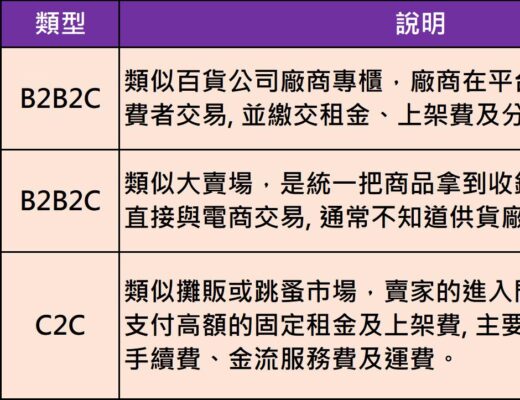
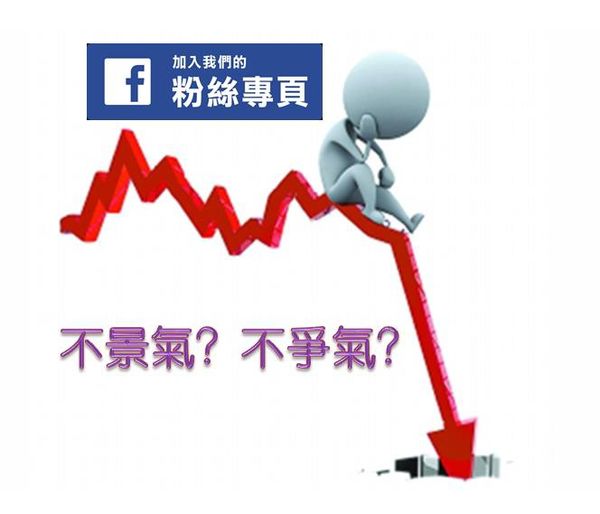
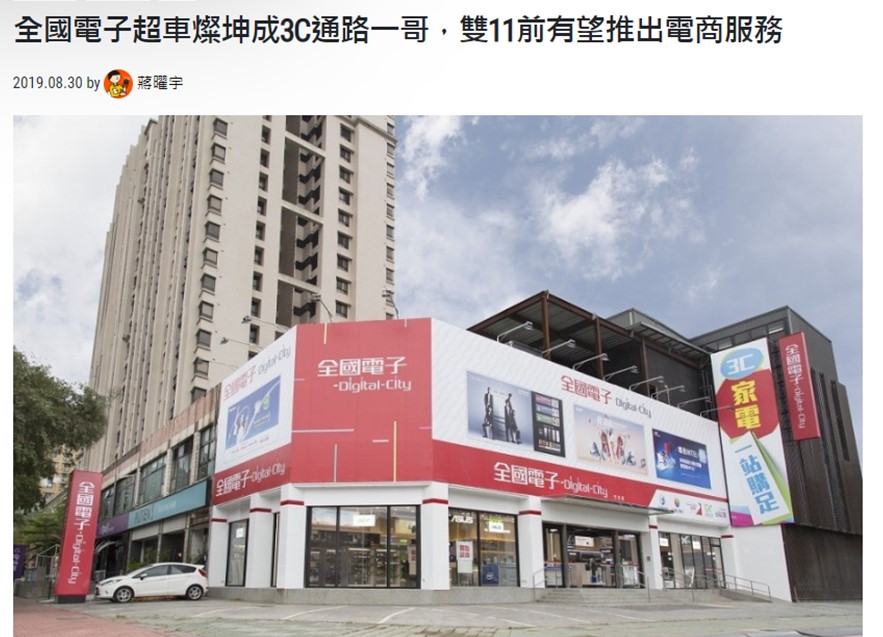
No Comments